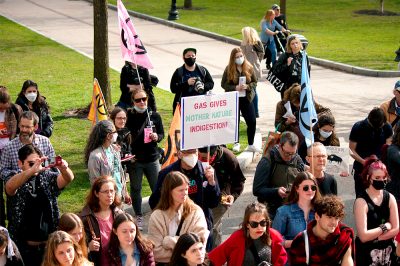
The Massachusetts Senate passed a climate bill with a vote of 37-3 last Thursday focusing on achieving net-zero carbon emissions goals by 2050.
The bill — titled “An Act Driving Climate Policy Forward” — includes 45 amendments such as putting $50 million toward electric vehicle charging stations, banning non-electric vehicle sales by 2035, increasing off-shore wind energy to 5,600 MW by June 2027 and investing $100 million toward renewable energy, among other policies.
The climate action bill comes as a follow-up to last year’s law, introduced by Senator Michael Barrett, that outlined short-term climate goals and authorized 1,600 MW of offshore wind energy less than the current goal for mid-2027.
Senator Sonia Chang-Diaz, who is also running for Massachusetts Governor this fall, called the bill “the boldest state climate plan proposed this year” but concedes that the Senate still “needs to do better.”
“We can and we must act with more urgency,” Chang-Diaz wrote in an April 14 tweet. “The only thing we’re missing is political courage.”
Chang-Diaz moved for a $100 million trust fund to expand fare-free transit. However, her amendment to invest in public transit did not get passed as the Senate focused more on electric vehicles.
This focus on climate justice echoes Mayor Michelle Wu’s transportation justice efforts — extending fare-free transit to three MBTA bus routes — in Boston.
Wu’s Boston-centric version of the Green New Deal included similar electrification goals as the Massachusetts Senate — instead of focusing on electric vehicles in a general sense though — she started with the electrification of Boston Public School buses in April.
“Not only are we working to electrify our school buses and municipal fleet for cleaner air throughout our neighborhoods, but these workforce development pipelines connected to electric vehicles will help support career pathways into the green economy,” Wu said in an April 6 press release.
The bill also focuses on public transportation by requiring a replacement of the MBTA’s “non-zero-emission passenger buses with zero-emission passenger buses” by January 2028.
Boston resident Rayna Deyoung — a graduate student from the New England Conservatory — said improving public transportation will aid in achieving the carbon emissions goal.
“I think Massachusetts has pretty good public transit,” Deyoung said. “So I think just making that even better would be a good way to reduce the amount of cars on the road and that kind of thing.”






















































































































